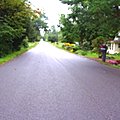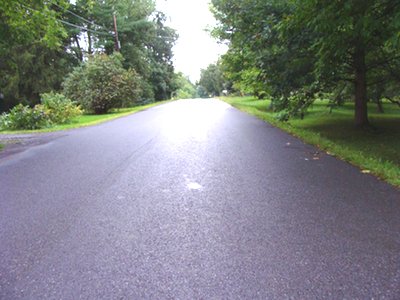- By Dan Veaner
- News
 Print
Print  The Lansing Highway Department is arguably the best in the county, and roads in the town are in generally very good shape. But repeated budget cuts and rises in the cost of materials is threatening Lansing's roads. Until four years ago Lansing's 96 miles of roadways were on a ten year resurfacing cycle. Since then the budget has allowed for three or four miles. That means that instead of ten years to re-top all Lansing roads it will take 25 years.
The Lansing Highway Department is arguably the best in the county, and roads in the town are in generally very good shape. But repeated budget cuts and rises in the cost of materials is threatening Lansing's roads. Until four years ago Lansing's 96 miles of roadways were on a ten year resurfacing cycle. Since then the budget has allowed for three or four miles. That means that instead of ten years to re-top all Lansing roads it will take 25 years.
"A lot of roads just won't last that long," Lansing Highway Superintendent Jack French says. "There's just no way, not with the winters and springs and thawing we get here."
Money to resurface town roads comes partly from state and federal CHIPS money, and partly from town taxes. CHIPS funding has remained stable, even though there was some fear a few years ago it would be reduced. That funding has remained steady at approximately $160,000 for the past half dozen years. That's enough to re-top just over two miles of road using two inches of hot-mix blacktop. The 60% reduction in the amount of mileage that is maintained each year is due to increases in the cost of materials, and decreases in the Town budget.
Budget cuts coincided with three factors that significantly impacted the town's ability to maintain its roads over the long haul. The first was the tanking economy. The second was rising costs. Third was the election of Scott Pinney as Town Supervisor, who ran on a platform that included reining in taxes and spending. Pinney has taken a no-frills approach to town spending, advocating projects that are truly needed, and cutting the rest. While that has been successful in keeping taxes down at a time when residents need any break they can get, it has not been friendly to long term maintenance planning.
Budget cuts and price rises have created a double-whammy to Lansing road maintenance. If prices had remained stable the Highway Department could have resurfaced possibly as much as eight miles per year, a reasonable reduction from the ten miles French prefers.
"It wasn't too long ago that we were paying $30 to $40 per ton for hot mix blacktop," French says. "Now it is at about $75 per ton. It's at least doubled over the last three or four years."
French and his crew do their best to stretch the dollars they have. The Highway Department has 14 employees, and owns its own paving equipment. The latest acquisition was the key element, a used paver that had been well maintained. The Town spent about $20,000 to purchase it, a bargain, French says, because it costs about $2,000 per day to rent one. The town also owns two rollers, one for black-top paving and another for stone and oil, and uses the same trucks that plow Lansing streets in winter to haul paving materials. The Town gets better roads by keeping the paving in-house, French says, because his crew takes pride in their work.
"We do all our own paving, which most towns don't," he says. "My crew has the know-how. We not only enjoy doing it, but we do a lot better job because it's our roads. It's not just a company getting in and getting out."
The other way to save money is to use less than optimal re-topping methods. French says they best case scenario is to put two inches of hot-mix blacktop onto roads that have a solid base. A mile of two-inch blacktop costs about $70,000 to $75,000.
A middle course is to put down one inch of blacktop. One-inch blacktop costs about $35,000 to $40,000 for a mile. Sometimes a cold black-top mix is used to save money, but it doesn't last as long as the hot-mix.
"It keeps it from completely falling apart," French says. "But an inch of blacktop is certainly not going to last as long."
Treating roads with stone and oil is less lasting, but significantly less expensive, costing about $20,000 per mile. Stone and oil is similar to the black goo you can spread on your driveway, but with stones laid on top. The stones makes the surface less slick so cars aren't driving directly over an oily surface. Within the next couple of weeks the Highway Department will be covering about three miles of road with stone and oil.
"The problem with stone and oil is it doesn't smooth the road out at all," French explains. "The oil fills the cracks, and the stone is to cover up the oil. If there's a pot hole or a bump in the road that bump is still going to be there if you use stone and oil."
But French says that oil today is a lot less effective in adhering the stone onto the road because of environmental requirements that have changed the formula. He says that when he started at the Highway Department a stone and oil road would last eight to ten years, but today it only lasts three or four years at most.

French and Deputy Supervisor Charlie 'Cricket' Purcell perform triage each Spring, determining which of Lansing's roads are in the worst shape. Those roads are slated, budget permitting, for two inches of blacktop. They fill in as best they can with less effective maintenance on roads that are not as deteriorated.
Because fewer miles of road are being paved, it obviously doesn't take as long to pave them. But French says his crew is kept busy on maintenance, patching roads that increasingly need it, maintaining ditches, and so on.
When these tasks and plowing aren't taking the manpower, the department takes on other projects. In recent years they have included erecting the Town's salt storage building, installing solar panels on the roof of the Highway Department building, transporting the North Log Cabin from Auburn to Lansing, putting a parking lot in at the entrance to the new trail across the road from the Town ballfields, and completely rebuilding the Town marina, saving the Town hundreds of thousands of dollars by keeping the work in-house.
French estimates that 90% of Lansing's roads have a good, solid base, and says Lansing's roads are probably in better shape than any others in the region. But do the math and an alarming picture emerges. Costs aren't going to go down any time soon, and using paving methods on 40% of miles that last shorter periods over a repaving cycle that is 250% longer is literally going to erode the quality of town roads in just one 25 year cycle.
Now add the town center initiative. That will add a few miles of new roadway to the town, but not enough to add a significant burden in maintenance. The real issue is that a strong infrastructure is essential in attracting developers to build in the town center area. That part of Lansing already has municipal water and high speed Internet cable access, and Town officials have been steadily working on a municipal sewer initiative that they hope will be feasible and affordable. The reputation of the Lansing schools and the Town's reputation for providing a high quality of services are the other pieces that will attract the right kind of development to the town center. That puts pressure on the Town to maintain the existing infrastructure as best it can.
"We're pretty lucky," French says. "Our roads are in super shape. I think they are in some of the best shape of any roads in the county. But sooner or later it's going to catch up with you if this whole process keeps going the way it is. There is no road in the town that is going to last 20 or 25 years."
{fcomment}
v7i33



